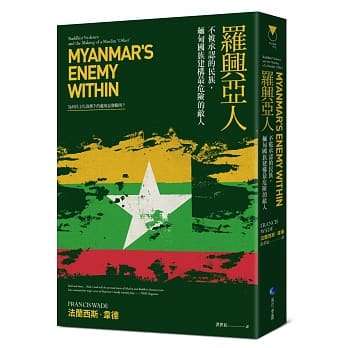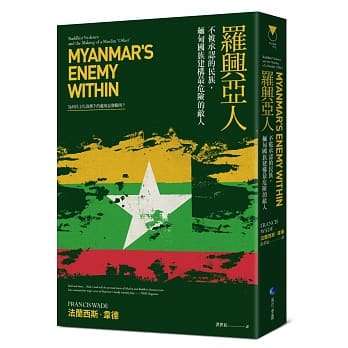The Rohingya: An unrecognized ethnic group, Myanmar's most dangerous enemy of nation-building.
The Rohingya: An unrecognized ethnic group, Myanmar's most dangerous enemy of nation-building.
In stock
Couldn't load pickup availability
出版社: 马可孛罗
ISBN/EAN: 9789860767377
出版日期: 2021-11-06
页数: 368页
语言: Traditional Chinese
Insult Myanmar! Get out of Myanmar! We don't need you in Myanmar!
You are not part of Myanmar!!
Why has the situation of the Rohingya become increasingly difficult amid the wave of democratization?
----Testimonials (arranged by the number of strokes in surname)----
Lin Weidi, publisher of the Monsoon Belt; Wu Xiangyuan; Senior Editor of the Southeast Group of Critical Commentary; Tang Nanfa; Independent UN Consultant and Refugee and Migrant Worker Service Provider; Weng Wanying; Freelance Writer; Zhang Zheng; Director General of China Central Broadcasting Corporation; Chen Mumin; Professor of the Institute of International Politics at National Chung Hsing University and Minister of the Chinese Representative Office in India; Yang Hao; Distinguished Professor of the Institute of East Asian Studies at National Chengchi University and Executive Director of the Asia Exchange Foundation of Taiwan; Yang Zhiqiang; Reporter Zhao Zhongqi; Associate Professor of the Department of Southeast Asian Studies at Jinan University; Liao Yunzhang; Director of the Independent Commentary @ World Channel
ASEAN Plus Nanyang Chronicles
Why do the Burmese discriminate against the Rohingya? Because...
Myanmar has an extremely complex ethnic composition, and the Burmese have been absolutely central to its independence. To maximize the interests of the Burmese, discrimination against ethnic minorities has been rampant, further intensified during the military regime. While Muslims have a long history in Myanmar, the Rohingya are mostly from Bangladesh. The uncertainty created by cross-border ethnic minorities threatens to trigger a domino effect of national fragmentation, leading the government and the people to inflict fear on the Rohingya.
Why do Rakhine people hate the Rohingya? Because...
Rakhine State, historically the Kingdom of Arakan, independent of Myanmar, served as a window connecting Indian culture to Burma. Due to its unique historical and geographical conditions, the Rakhine people gradually developed a sense of their own ethnic identity. This was particularly true when British colonists forcibly merged India, Bangladesh, and Burma under one colonial power. Centuries of ethnic migration and unfair resource allocation created a pressure cooker of anger, threatening to erupt at any moment. Finally, as democratic transition accelerated, this anger consumed everything the Rohingya had.
Why are Buddhist monks killing Rohingya? Because...
Buddhism and monks have long been the disseminators of knowledge throughout Myanmar's history, and their reverence is undeniable. During both military rule and the democratic transition, monks have served as social advocates, advocating for the people. Buddhism, unaffected by the regime's erosion, has consistently defended the people. The Burmese people's long-standing discontent demands leadership, and monks are leading the charge, striving for a more complete and stronger Myanmar. The nascent "Buddhist nationalism" has primarily targeted the large Muslim and Rohingya populations.
Why did Aung San Suu Kyi remain silent? Because...
Aung San Suu Kyi is Burmese, and the National League for Democracy (NLD) she leads is also predominantly Burmese. Years of distorted democratic development have left the NLD lacking the resources to integrate nationalist and Buddhist forces and international aid. The military, still in power, holds a conservative view of Myanmar's "eternal indivisibility," which resonates well with Buddhist nationalism. Caught between a rock and a hard place, Aung San Suu Kyi has adopted silence as a strategy.
“A must-read for understanding how things spiral from bad to bad.” —The Economist
They had been neighbors and friends—Muslims and Buddhists.
But since when have the Rohingya been considered no longer “human” from birth?
The author conducted on-site interviews to uncover this violence fed by fear:
Why did the belief that united the country eventually turn into a horrific genocide?
Francis Wade
A journalist specializing in Myanmar and Southeast Asia. He began reporting on Myanmar in 2009, collaborating with the Democratic Voice of Burma, a news organization based in exile in northern Thailand. He subsequently covered Myanmar's transition from military rule and the violence that accompanied it. He has also covered South and Southeast Asia for The Guardian, the London Review of Books, Time magazine, the New York Review of Books, and other publications. He is based in London.
Hong Shimin
A sixth-year student, he graduated from the Foreign Languages Department and is currently a full-time translator. He has won the Wu Dayou Popular Science Translation Award. His translations cover various fields, including "The Road of Thieves, Heroes, and Revolutionaries", "The Islamic Enlightenment", and "How to Do Nothing".
Preface
Introduction, The Massacre, Chapter 1, When Neighbors Turn Against One Another, Chapter 2, Widening Divides, Chapter 3, The British and the Birth of a Divided Nation, Chapter 4, Rangoon's Peculiar Deal, Chapter 5, Creating Identity, Manipulating Divides, Chapter 6, Social Engineering and Prison Villages, Chapter 7, 2012: The Making of a Disaster, Chapter 8, The Faltering Democratic Experiment, Chapter 9, Buddhists Preaching Hate, Chapter 10, The Apartheid State, Chapter 11, Disguised Identities, Chapter 12, Broken Fragile Ties, Chapter 13, Quiet Democracy and a Dysfunctional UN, Chapter 14, After the Killings
Acknowledgements
Share


